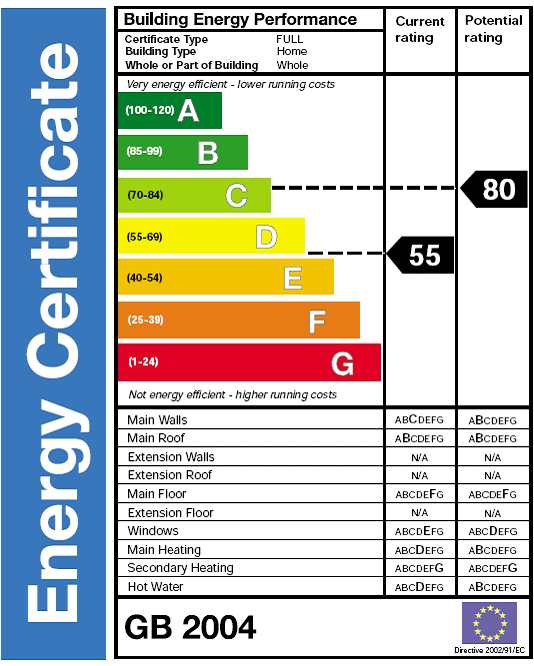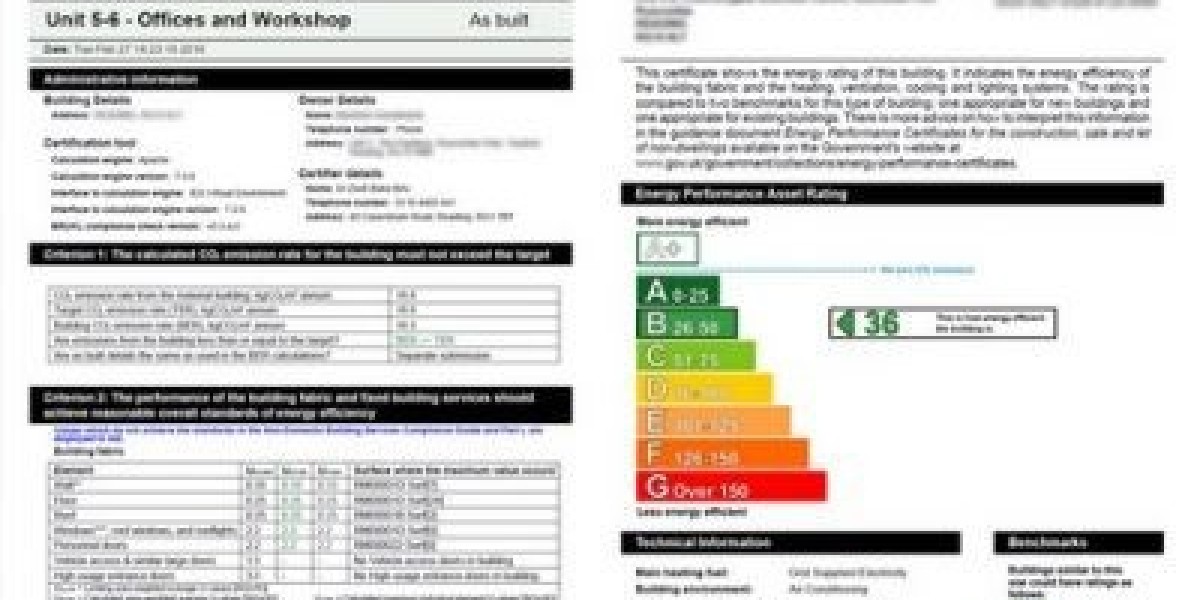Let me know some misconceptions about Fully Accredited Commercial Energy Assessors that you've observed
An EPC is important for potential buyers as it gives information about the property’s general energy efficiency, how much energy it uses, and what energy costs are involved in the running of the property. The EPC also gives advice on how to improve the property’s energy efficiency, helping to further reduce energy costs. The introduction of the Energy Efficiency (Private Rented Property) (England and Wales) Regulations 2015 (SI 2015/962) (MEES Regulations) created a requirement that in certain circumstances properties in England and Wales can only be let if a minimum energy efficiency standard has been met. As of the 1st August 2007, all domestic and commercial buildings in the UK available to buy or rent must have an Energy Performance Certificate (EPC). If you own a home or a business, getting an energy performance survey done could help you identify was to save money on your energy bills and improve the comfort of your home or business. As part of a European Directive, an Energy Performance Certificate (EPC) is still mandatory if you intend to sell or rent your property. EPCs will provide information on a building's energy efficiency using a simple sliding scale - 'A' being the most efficient, to 'G' the least efficient In addition to the Energy Efficiency Rating (relating to running costs), the EPC will also show the Environment Impact Rating (relating to the carbon dioxide emissions). The Minimum Energy efficiency Standards (MEES) legislation requires a rating of level E or better for domestic and commercial rented properties, this is confirmed by the EPC, and if the rating is below E then actions to take to improve the energy performance of the building can be implemented. An EPC informs the tenant about the energy performance of a property. It is a legal requirement for the landlord to provide a commercial EPC prior to your property being marketed. A copy of an EPC must be made available to prospective tenants at all times. A commercial EPC is valid for ten years from the date of issue.
EPCs are administered and regulated for separately in (a) England and Wales, (b) Scotland and (c) Northern Ireland. EPCs were introduced in England and Wales on 1 August 2007 as part of Home Information Packs (HIPs) for domestic properties with four or more bedrooms. Over time this requirement was extended to smaller properties. When the requirement for HIPs was removed in May 2010, the requirement for EPCs continued. If you’re selling or you’re a landlord and you do not have an EPC you could be fined up to £5,000. And under new government proposals this would be increased to £30,000 from 2025. If you can, plan for the longer term. The Government has made clear that they are keen to introduce ambitious energy efficiency targets. The 2020 Energy white paper indicated that all commercial properties would be required to achieve an EPC rating of at least B by 2030. Private landlords won’t have to make improvements if they have registered the property as exempt (they will also have to reapply for the exemption every five years). You can check if your home is exempt via the Government website. There are multiple approaches to facilitating a mees regulations in the workplace.
Landmark Register
All commercial properties require an Energy Performance Certificate when being sold or let. Ratings are often used by tenants or potential buyers to make energy comparisons between properties. A Commercial EPC comes with a recommendation report that outlines how the energy performance of the building could be improved. Energy Performance Certificates are rated from ‘A’ to ‘G’, with ‘A’ being the most energy efficient, and ‘G’ being the least. The certificate will show what the current rating is and which letter category it falls into. The best thing about the EPC is that it also shows the potential rating. The drive towards 100% net zero carbon buildings presents a challenging landscape. Engaging with an independent consultant to develop fully optimised, low to zero carbon solutions from the outset will ultimately save you time, money and of course energy. There are a couple of reasons why you might choose to get a domestic EPC. The first is that you will need one if you are planning to sell your house. Prospective buyers may be more likely to make an offer if the property has a good rating. The other is that it gives you information about your property that can help you improve its efficiency and save you money on your bills. Tackling fuel poverty has a wide range of social benefits. Cold homes are recognised as a source of both physical and mental ill health. Transforming our housing stock so that homes are warm, healthy and fit for the future will help protect the health of those most vulnerable and reduce the strain on our NHS, whilst complementing the approach to more preventative healthcare. Professional assistance in relation to non domestic epc register can make or break a commercial building project.The EPC certificate gives an indication of how costly the building will be to heat and light for anyone wanting to buy or rent it. The certificate provides information about a property’s energy use and how it can be improved. With an EPC, recommendations are provided, along with costings for improvements, that will achieve a better energy rating Commercial EPC quotes are usually provided by a team of fully accredited and insured energy assessors with vast experience in the industry. Most assessors are members of one of the main accreditation schemes (Elmhurst, Stroma, NHER or BRE). Feed-In Tariffs (FITs) provide a long term payment to individuals and organisations that install a range of small scale renewable technologies. The full FIT payment for Solar PV is only available if an EPC has been obtained and it has a “D” or better rating. There are some exemptions, notably schools and community energy projects. NDEPCs are not Display Energy Certificates (DECs) and should not be confused with such. All larger public buildings require an annual Display Energy Certificate (DEC) highlighting their actual energy consumption and energy performance. To query any information on your EPC, householders should contact the energy assessor who produced the EPC (name and contact details are provided on the EPC). It is also worth checking the issue date on the EPC, as it is more likely that an EPC issued within the last few years will be the most accurate. Formulating opinions on matters such as mees can be a time consuming process.
Ensuring Your EPC Is Genuine
In April 2018, Minimum Energy Efficiency Standards came into force in England and Wales. MEES makes it a legal requirement for all privately owned properties to have an EPC rating of at least an 'E' before they are let. From April 2020, MEES will be extended to existing lettings of residential property and in April 2023 to existing lettings of commercial property. Energy Performance Certificates (EPCs) are needed for most domestic properties being marketed for sale or let. Only accredited domestic energy assessors will be able to carry out assessments to produce Energy Performance Certificates Trafford Surveyors employ in-house BRE-accredited Energy Assessors, who produce EPCs for all types of properties. Recent research has identified that EPCs understate the thermal efficiency of solid walls. The Government is proposing to recalibrate EPCs to give a truer reading. This could mean that some solid wall properties currently rated F under an EPC will no longer require any work and less work may be required in the case of a G rated property. An EPC is not a structural or building survey, condition report or property valuation. An EPC should not be read as a comment on the overall condition of the property nor will it comment on the presence or otherwise of asbestos, high alumina cement concrete, additives including calcium chloride, or any building defects or hazardous materials. Since 1 April 2018, and the introduction of the Minimum Energy Efficiency Standard Regulations (MEES), the EPC rating has actually meant something, as landlords are not permitted to enter into new lettings on properties with an EPC rating below the threshold E rating (subject to certain exemptions). This includes lease renewals and lease extensions, but not assignments, licences to occupy or agreements for lease. There are many options available when it comes to epc commercial property in today’s market.There are many things that can affect your EPC rating, but it's worth knowing that your rating has more to do with your property than your lifestyle. With the UK having the leakiest homes in western Europe, it's quite hard to achieve an A-rating. You may not waste energy, but if your home is poorly insulated, or if you have no heating, or old electric-only heating, your EPC rating may be lower than you expect. An EPC lets buyers or tenants know how energy efficient the property is. Without doubt lower energy costs help sell or rent out houses. A solicitor will need an EPC to sell a property. When a building or building unit is offered for sale or rent, the asset rating of the building in the EPC must be stated in commercial media where one is available. This would include, but is not restricted to, newspapers and magazines, written material produced by the seller, landlord or estate or letting agent that describes the building being offered for sale or rent or the internet. A Domestic Energy Assessor will carry out a number of checks on your property, taking into account heating, lighting & dimensions throughout the building to identify areas where heat may be lost, through windows, ceilings and walls for example. The property will be inspected to give an indication of how much it will cost to power and heat your home. The EPC also identifies the amount you could potentially save should you improve the energy efficiency of the household running costs as outlined within the Certificate. Few people self-identify as living in fuel poverty. However, many households face challenges in heating their home, particularly over the winter months. Fuel poverty is the problem faced by households living on a low income in a home which cannot be kept warm at reasonable cost. Fuel poverty can mean making stark choices between energy and other essentials or falling into debt. For some, the result is living in a cold home, which has negative impacts on health and wellbeing. Its always best to consult the experts when considering commercial epc these days.
Save Money On Your Energy Bills
Your EPC will have two charts which display the Energy Efficiency Rating (running costs) and the Environmental Impact Rating (CO2 emissions). You will be able to see your current rating alongside the potential rating you could achieve by making the recommended improvements. Your rating will be scored between 1-100 points which are divided into categories and reflect the energy efficiency from high to low. Many farm buildings are exempt from the requirement to obtain an EPC. Most buildings which are sold or rented out will require an EPC. The intention is that an EPC is not required for buildings which do not use fuel or power for controlling the temperature of the internal environment (for instance a cattle shed). 20% of a home’s heat is lost through the roof and 10% through the floor. Modern insulation can address leaky roofs and replacing or sealing older floors will reduce loss through the ground. Double glazing is a must and to go the extra step consider getting your properties triple glazed. One can uncover additional intel appertaining to Fully Accredited Commercial Energy Assessors at this UK Government Publications article.Related Articles:
Background Findings On Non-Domestic Energy Performance Certificate ContractorsMore Information On Professionally Qualified Domestic Energy Contractors
Additional Information On Commercial Energy Performance Contractors
Additional Findings On Commercial and Domestic EPC Assessors
More Insight With Regard To Fully Accredited Energy Assessors
Further Findings About Low Carbon Energy Assessors
More Insight With Regard To Commercial Energy Performance Certificate Contractors








